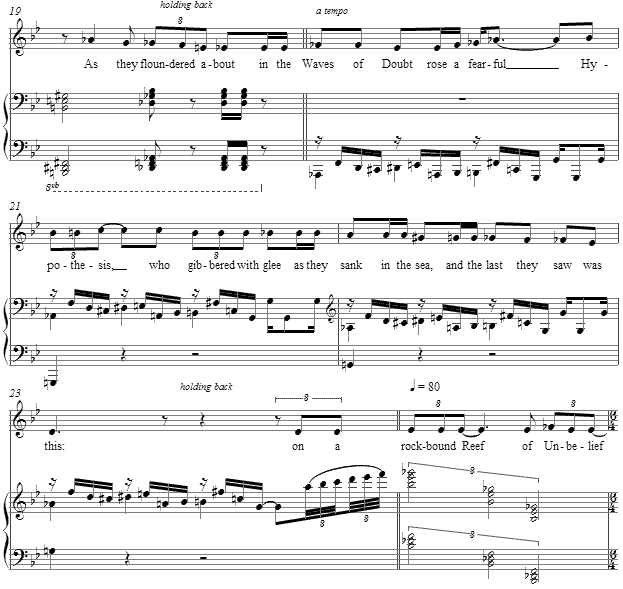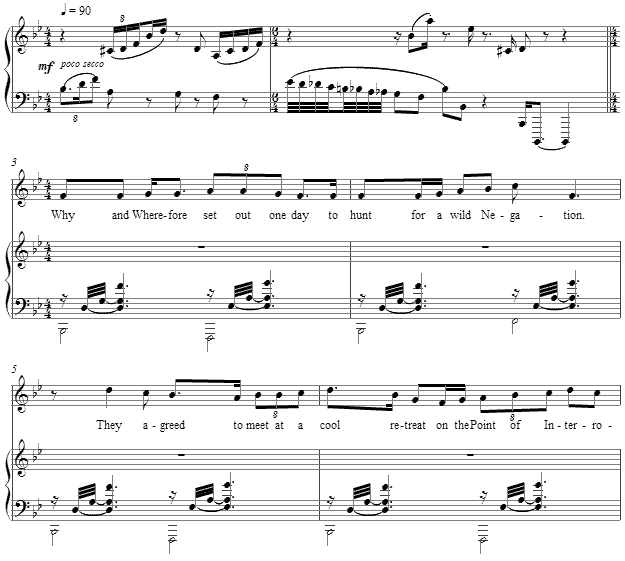Music and Texts of GARY BACHLUND
Vocal Music | Piano | Organ | Chamber Music | Orchestral | Articles and Commentary | Poems and Stories | Miscellany | FAQs
Metaphysics - (2006)
Oliver Herford
for medium high voice and pianoto those important musicologists, Professor Why and Doctor Wherefore
Why and Wherefore set out one day
To hunt for a wild Negation.
They agreed to meet at a cool retreat
On the Point of Interrogation.
But the night was dark and they missed their mark,
And, driven well-nigh to distraction,
They lost their ways in a murky maze
Of utter abstruse abstraction.
Then they took a boat and were soon afloat
On a Sea of Speculation,
But the sea grew rough, and their boat, though tough,
Was split into an Equation.
As they floundered about in the Waves of Doubt
Rose a fearful Hypothesis,
Who gibbered with glee as they sank in the sea,
And the last they saw was this:
On a rock-bound Reef of Unbelief
There sat the wild Negation;
Then they sank once more and were washed ashore
At the Point of Interrogation.[ 4 pages, 1 '55" ]
Oliver Herford
Oliver Herford (1863 - 1935) English-born American poet, illustrator, and wit, published over 50 volumes of light verse and prose. "Metaphysics" is drawn from The Bashful Earthquake (1898). Known as "the American Oscar Wilde," Herford, was born in Sheffield, England, and as an illustrator and humorist drew heavily from the contemporary European modes of caricature exemplified in the pages of British journals such as the London Vanity Fair and Punch.
I chose to dedicate this song setting to two anonymous musicologists, represented yet hidden by the noms-de-guerres of Professor Why and Doctor Wherefore, who both taught me quite distinctly by their own example that poorly skilled musicians can make decent careers in music by surviving and thriving in the pantheon of musicological academia where never again would they be required to demonstrate the paucity of their minimal musical skills and insights.
As one pundit recently wrote of "the institutional vanity and intellectual slovenliness of .... campus-based intelligentsia," I feel strongly that musicians -- and musicologists claim to be musicians -- must perform alongside their wordiness to show and teach the meaning in music, not merely write copiously about music in words and more words, a pursuit which remains utterly bound in language alone. Professor Why and Doctor Wherefore would have been sorely tested thereby, and proven, like Andersen's famed Emperor, to have had "no clothes."
Let it be said herein that I also hold some other musicologists in high esteem for their public performances and passion for music as a living art. For them, this simple score would be child's play, while for Professor Why and Doctor Wherefore, it would be an insurmountable challenge. Therein lies the tale.
The tessitura of the setting lies mostly in the middle range, with the highest point coming at the "split" as their "boat, though tough" is broken on the crashing waves of rising chromaticism. The setting vacillates between a music hall style and structured dissonance, chromaticism flowing over a twelve-tone row, yielding to a short and tonally varied snippet of the "Liebestod" from Wagner's Tristan und Isolde.
"As they floundered about in the Waves of Doubt," the fearful hypothesis announces itself in three repetitions, as chromaticism gives way to the twelve-tone row, the supposedly logical extension and "freeing" of the tonal system which became itself an orthodoxy in too few short decades. For my own little joke, each repetition of the row is ended by simple octaves creating a pedal beneath the repetitions and binding it to the tonal region of that moment, as the vocal line simply descends chromatically.

A musicologist -- or music critic, for that matter -- with demonstrably adequate musical skills should take no offence. Musicologists with inadequate musical skills should be ashamed of themselves, and return to the practice room forthwith.

